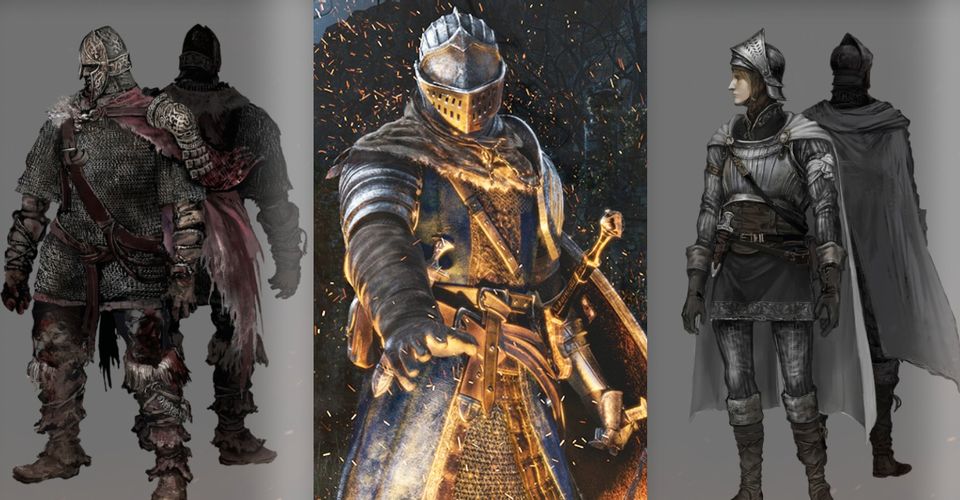Dark Souls RPG’s Classes & Character Creation Explained

The character classes that will be available in Dark Souls: The Roleplaying Game have been revealed, with many of them sharing elements with the classes in the Dungeons & Dragons 5e ruleset. Dark Souls: The Roleplaying Game is an upcoming tabletop RPG that is based on the classic video game of the same name. Dark Souls: The Roleplaying Game uses D&D 5e rules, so players of the most popular RPG in the world won’t be left out when attempting to run a game using the system.
Dark Souls: The Roleplaying Game might be compatible with the 5e D&D rules, but that doesn’t mean it’s just a reskin. Dark Souls: The Roleplaying Game has new rules that match the mechanics of the video games. The players have a combined hit point and stamina meter, called Position, which is a resource that is used to perform certain special moves in combat. The Bloodied status effect from 4e D&D is back, giving player characters and monsters new abilities when they drop below 50% of their maximum hit points. The magic system has been overhauled, in order to bring it closer to the system in the Dark Souls video game, which means the spellcasting classes will be different. Most importantly, the characters will be revived at bonfires when they die, in the same way as the video game. There is a price to pay for this method of resurrection, however, as the players can permanently lose a piece of themselves when they are brought back, and there is only so much they can lose before there is nothing left to give.
In Dark Souls: The Roleplaying Game, the player doesn’t roll for stats, or use the D&D standard array system for stats. Instead, the player selects from one of four Origins: the Brute, the Fencer, the Jack of all Trades, and the Caster. It seems that these are also the background equivalents in the game. The player then selects from one of ten classes, in order to flesh out their character’s abilities, before sending them off into battle.
The Dark Souls RPG Will Feature The Knight, Mercenary, Warrior, & Herald

It should come as no surprise that Dark Souls: The Roleplaying Game has several melee combat characters, as most players will have to resort to blades or bows to finish off their foes. The herald once served some noble cause in life and they retain their sense of duty in their new undead form. In combat, the herald specializes in defense and can use healing spells to keep their allies alive. It seems that the herald will be the equivalent to D&D‘s holy paladin character class in Dark Souls: The Roleplaying Game.
The knight seems like it’s the all-rounder in terms of combat abilities, which makes sense, considering how it’s often the first choice for new Dark Souls players. The lore surrounding the knight is equally ambiguous, making it easy for the players to come up with their own detailed backgrounds. The mercenary is the master of dual-wielding weapons and fighting in light armor, suggesting they are the D&D ranger equivalent in Dark Souls: The Roleplaying Game. Like the knight, the mercenary’s backstory has a lot of room for the player to come up with their own ideas. The members of the warrior class hail from the frozen north, where each day is a battle for survival against the elements. The warrior class specializes in two-handed weapons and they can enter a state of mind that lets them become engines of destruction, suggesting they are the D&D two-handed barbarian equivalent in Dark Souls: The Roleplaying Game.
The Cleric, Sorcerer, & Pyromancer Will Be The Dark Souls RPG’s Magic Classes

Dark Souls: The Roleplaying Game will feature three different types of magic: spells, miracles, and pyromancies. These work differently to the spells in D&D 5e, as the character has a certain number of attunement slots for their spells in Dark Souls: The Roleplaying Game and each spell has a finite number of uses. There are three classes that focus on each of the types of magic in Dark Souls: The Roleplaying Game. The people who enjoy D&D homebrew could adapt the Dark Souls RPG’s magic system into their own games.
The cleric specializes in miracles, which contains healing spells and magic that can damage evil beings, such as demons. The clerics believe their magic comes from some divine being and they still maintain their faith, even in the shattered realm of Lothric. The pyromancer specializes in pyromancies, which are fire magic spells that can immolate enemies. The pyromancers claim descent from the four lords of Cinder and many seek to master the magic that is their birthright. The sorcerers specialize in spells, which tap into arcane energy that can bypass natural defenses. The skills that the sorcerers gained came at a terrible price, as their forbidden knowledge has led to them being hunted by creatures from beyond. The sorcerer needs stout allies to protect them from their pursuers, as their magic will only take them so far. The magical arts of pyromancy, sorcery, miracles, and hexes from Dark Souls are present in the tabletop game, but the party dynamic means that the spellcasters won’t have to worry about entering melee combat for themselves.
The Assassin, Thief, & Deprived Round Out The Dark Souls RPG Class Roster

In D&D 5e, the assassin and the thief are subclasses of the rogue, with assassins specializing in taking out foes in combat, and thieves using surprise gimmicks in combat. In Dark Souls: The Roleplaying Game, the assassin specializes in focusing on a single foe in combat and taking them down as quickly as possible. They are able to do this through stealth, or through using their allies as a convenient distraction. The thief specializes in ranged combat, as it can pin down foes with arrows and strike individual weak points. This suggests it’s close to the overpowered fighter/rogue build in D&D. Both the assassin and the thief are masters of staying undetected and moving from shadow to shadow, which means that the stealthy approach should be more viable than it is in Dark Souls.
The deprived class from Dark Souls is present in Dark Souls: The Roleplaying Game. In Dark Souls, the deprived starts without any gear, but their stats are equal, making them ideal for challenge runs. In Dark Souls: The Roleplaying Game, the deprived starts without any gear or magic to aid them. Luckily, Dark Souls: The Roleplaying Game is a team-based game, so one player who becomes a deprived can at least be carried by their allies until they can scrounge up some gear and master some magic.
Dark Souls: The Roleplaying Game can be pre-ordered from February 8, 2022.
Source: Steamforged Games
About The Author


















